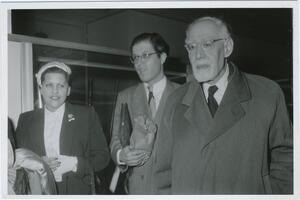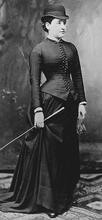Lilli Marx
Born in Berlin, Lilli Marx began her activism in 1948 when she helped found a Jewish newspaper, Jüdische Allgemeine, which remains the only national Jewish weekly in Germany. In her efforts to create a dialogue between German society and the Jewish community, she created the Gesellschaft für christlich-jüdische Zusammenarbeit (Society for Christian-Jewish Cooperation) in 1951. She contributed to the creation of several Jewish organizations, most notably helping to reestablish the League of Jewish Women (JFB). At JFB, she helped increase the group’s membership, publish a book of prayers, and organize working sessions. Later in her life, as the tide of Jewish women’s activism shifted towards Zionism, she adjusted her focus and participated in organizations such as the Women’s International Zionist Organization.
When Lilli Marx returned to Germany in the autumn of 1946, she threw herself energetically into the task of rebuilding Jewish life in the country. She was particularly involved with the Jüdischer Frauenbund (the League of Jewish Women, or JFB), which she re-established together with Jeanette Wolff (1888–1976), Ruth Galinski (1921-1914), Inge Marcus (b. 1922), and others. Pursuing the great tradition of the League, she created an important forum for the women survivors of Germany.
Early Life
Lilli Marx grew up in her birthplace, Berlin, in a liberal Jewish family. Her father, Arthur Behrendt, a businessman, was born in 1888 in Berlin and died in the Neuengamme concentration camp in 1941. Her mother, Henriette (née Silberstein), a homemaker, was born in 1892 in Berlin and died in the Ravensbrück concentration camp in 1942. In 1934, insulted by fellow pupils, Lilli switched from a public to a Jewish school, which she completed at the middle-school stage. Further schooling and professional training were denied to her. In 1938, at the age of eighteen, she emigrated to England with a “Domestic Permit.” Here she met her future husband, Karl Marx (1887–1966). In 1946, motivated primarily by Karl’s desire to help the Jews who remained in the country, the couple returned to Germany, settling in Düsseldorf. Here Karl took over the publication of a Jewish newspaper. In 1948 this grew into the Jüdische Allgemeine, which remains the only national Jewish weekly in Germany. Lilli Marx co-founded the paper and for twenty years collaborated in its publication. At the same time, she and her husband became actively engaged in activities designed to creating a dialogue between German society and the Jewish community.
In 1949 Lilli Marx founded the Düsseldorf Jewish Women’s Association (Düsseldorfer Jüdischen Frauenverein), whose members engaged in social work for the community, caring for the needs of survivors and refugees. Similar women’s organizations were recreated in other cities, making an invaluable contribution to the improvement of living conditions among the Jewish community and to the rebuilding of the communal structures.
League of Jewish Women
In 1951 the couple were among the founders of the Gesellschaft für christlich-jüdische Zusammenarbeit (Society for Christian-Jewish Cooperation) in Düsseldorf. In 1953 Lilli Marx organized a conference of the women’s associations of northwest Germany. The same year saw the reinstitution of the JFB, which had been banned by the Nazis. Lilli Marx was, from the first, a member of the board, leading the organization’s activities, in which the German-Jewish women and those whose origins were in Eastern Europe worked amicably together. By the mid-1950s the JFB included eighteen women’s associations, with a total of approximately 1,700 members from all parts of the Federal Republic. Since the reinstitution of the JFB occurred exactly fifty years after its original founding by Bertha Pappenheim in 1904, the organization marked the occasion by issuing a book of prayers composed by Pappenheim, which had first been published in 1936, the year of her death.
Lilli Marx was profoundly concerned with nurturing the legacy of JFB for the many young women of her generation who were unfamiliar with it. The JFB’s newsletter, “The Woman in the Community” (Die Frau in der Gemeinschaft), regularly contained articles which referred to the “honorable past of Jewish women’s activities in Germany.” Lilli Marx bore responsibility for the publication of the newsletter, which has appeared as an occasional supplement to the Jüdische Allgemeine since 1956. It was “to reflect the events in its own domain and the opinions and responsibilities of women in the Jewish community, as well as the work of Jewish women throughout the world.” It reported on the activities of the regional associations, the regular working sessions of the JFB and the conferences of the International Council of Jewish Women. However, Lilli Marx always referred not only to Jewish matters but also to those of general concern to all women.
Organization of the JFB’s working sessions was another major aspect of Lilli Marx’s activity. The sessions’ agendas included discussion of numerous issues: the duties of Jewish women, professional training in social work, the education of young people, human rights and human dignity, and women in developing countries, to name just a few. Well-known women, both Jewish and gentile, were invited to participate in the sessions. Lilli Marx saw the JFB as an integral part of society in general and was therefore determined to include topics which related to contemporary society as a whole.
Later Life
JFB became a member of the International Council Of Jewish Women in 1954. Three years later, four women from Germany, including Lilli Marx, first participated in one of its conferences. Over the years, Lilli Marx experienced a great deal of suspicion towards the German delegates since many people felt that Jewish life in Germany was totally unacceptable: “We had to run the gauntlet, but we didn’t let them take the butter off our bread,” she said.
Lilli Marx headed the JFB for almost twenty years, handing over its leadership in 1972. Thereafter she commuted between Germany and Israel with her second husband, the Israeli author Alexander Czerski (1920–1986), returning to Düsseldorf after his death. The Women’s League she had established in the city had meanwhile been dissolved. “Women in the Community” had ceased publication in 1980. The JFB was no longer of any significance in Germany. Many of the women born after 1945 identified strongly with the State of Israel and preferred to participate in Zionist activities such as WIZO (Women’s International Zionist Organization), where even Lilli Marx found a new sphere of activity. She was also a member of the Council of the Düsseldorf Jewish community. Lilli Marx could not conceive of a life devoid of involvement. She continued to be a splendid personality, interested in life and in everything innovative, and always ready to find enrichment in every human encounter. She died in the Jewish old-age home in Düsseldorf on April 5, 2004.
Brenner, Michael. “Witness Account.” In After the Holocaust: Rebuilding Jewish Lives in Postwar Germany. Princeton: Princeton University Press, 1997.




